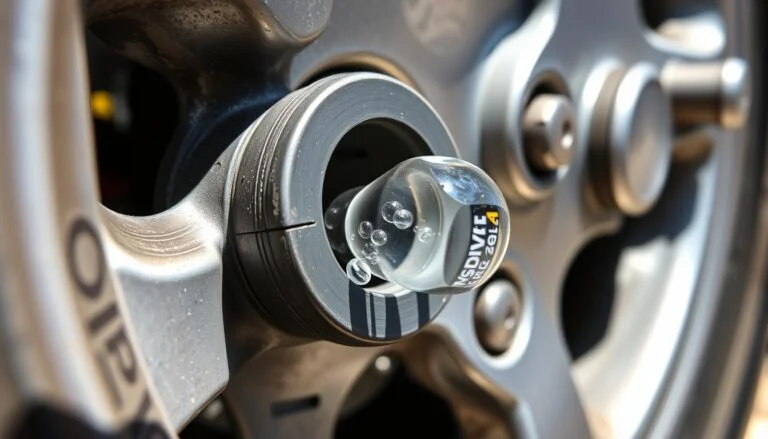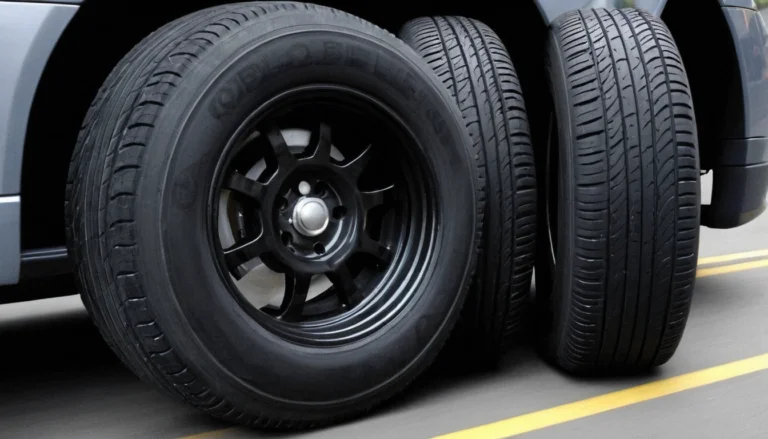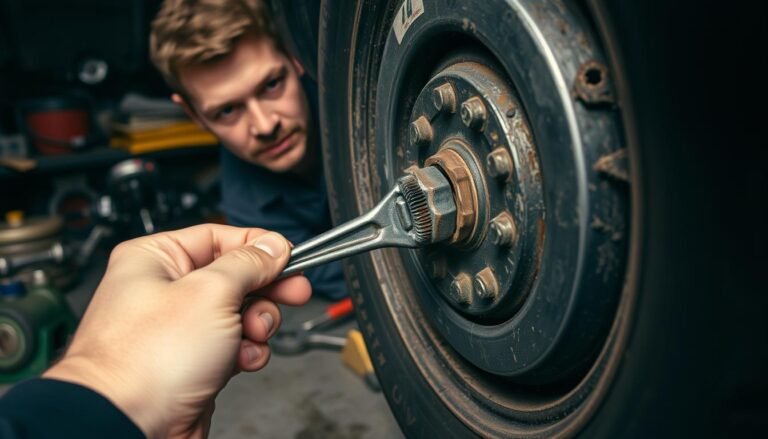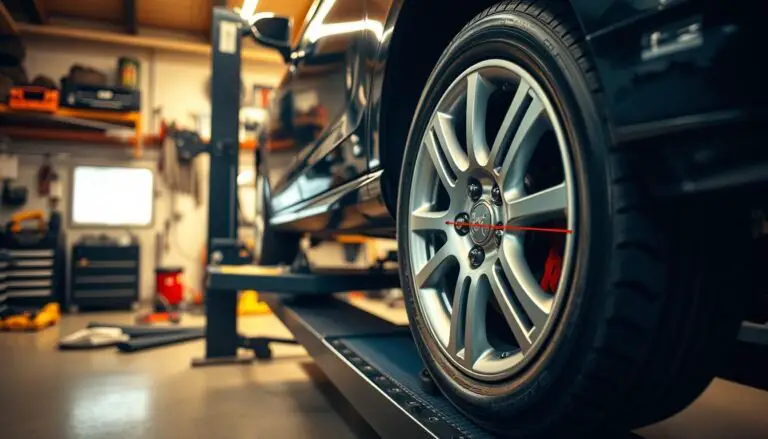What Causes Vibration in Steering Wheel. How to Fix It?
Steering wheel vibration can be a big problem, affecting both comfort and safety while driving. It can go from a small issue to a serious danger if not fixed quickly. Knowing why your steering wheel shakes is key to a smooth and safe drive. We’ll explore the main reasons for steering wheel tremors and offer ways to fix them.
Our guide will help you find and fix steering wheel shake problems. It will also show you how to lessen steering wheel tremors. This will make your driving experience better and safer.

Key Takeaways
- Understanding the primary causes of steering wheel vibration can help prevent further damage.
- Tire wear and damage, wheel balancing issues, and misalignment are common culprits.
- Regular maintenance and periodic checks can reduce steering wheel tremors.
- Suspension repairs and brake system inspections are essential to ensure vehicle safety.
- Professional services can provide accurate diagnosis and effective solutions for persistent issues.
Introduction to Steering Wheel Vibration
Feeling your steering wheel vibrate while driving can be scary. There are many reasons why this happens, and knowing them is key for your safety. This shaking often points to problems with your car’s tires, wheels, or suspension.
When your car vibrates, it affects your drive and might signal a bigger issue. It’s vital to find and fix the reasons for the shaking. This keeps your car running well and safe.
Let’s dive into why steering wheel vibration happens and why it matters:
| Symptom | Potential Cause |
|---|---|
| Steering wheel shakes | Unbalanced tires |
| Car vibrates when driving | Wheel misalignment |
| Steering wheel vibration at high speeds | Suspension component issues |
Fixing these issues is crucial for a better driving experience. It also helps avoid damage to your car and keeps you safe. Always watch for unusual signs while driving and get help when needed.
Common Causes of Steering Wheel Vibration
Understanding why your steering wheel vibrates is important. It helps fix the problem. Several common factors can cause this issue. Let’s look at some of the main reasons.
Tire Wear and Damage
Tire wear causing vibration is a big problem. Uneven tire wear or damage leads to unbalanced rotation. This affects the steering wheel’s stability.
Wheel Balancing Issues
Wheel balancing is key for a smooth ride. If wheels are not balanced, they cause steering wheel shaking. It’s important to balance wheels correctly to avoid this.
Misalignment of Wheels
Wheel misalignment affects your car’s handling and stability. When wheels are not aligned, they don’t roll together smoothly. This causes vibrations in the steering wheel. Regular checks are vital.
Suspension Component Problems
Worn-out suspension components and wheel vibration are common issues. The suspension system helps absorb road shocks and keeps tires in contact with the road. Problems here can cause more vibration. Keeping these parts in good shape is crucial.
Diagnosing Steering Wheel Vibration
Steering wheel vibration can be unsettling. But knowing where it comes from is the first step to fixing it. A steering wheel vibration diagnosis can help find the exact cause. By carefully checking your vehicle, you can decide if you need a pro’s help.
First, note when the vibration happens. Does it happen at certain speeds, when you accelerate, or when you brake? These details can help narrow down the cause.
- Visual Tire Inspection: Look for uneven wear, bulges, or objects stuck in the tires. Damaged tires are a common problem.
- Check Wheel Balance: Unevenly balanced wheels cause vibrations at high speeds. Get them balanced by a pro.
- Inspect Alignment: Misaligned wheels cause uneven tire wear and vibration. Look for signs like the car pulling to one side.
- Examine Suspension Components: Worn or damaged suspension parts can cause vibrations. Inspect these parts closely.
- Brake System Check: Vibrations when braking might mean brake rotor or pad problems.
By following these steps, you can better troubleshoot steering wheel vibration. This approach helps you understand the problem and find a solution.
| Observation | Possible Cause | Recommended Action |
|---|---|---|
| Vibration at High Speeds | Unbalanced Wheels | Get Wheels Balanced |
| Vibration When Braking | Brake System Issues | Inspect and Replace Brake Components |
| Vibration During Acceleration | Tire Wear or Damage | Perform Tire Inspection |
| Vehicle Pulls to One Side | Wheel Misalignment | Check and Align Wheels |
| Continuous Vibration | Suspension Issues | Inspect Suspension Components |
Knowing these steps empowers you to troubleshoot steering wheel vibration. It also helps you talk to car experts if you need more help.
How to Fix Steering Wheel Vibration
It’s important to find and fix the reasons for steering wheel vibrations for a smooth drive. We offer practical tips for fixing and maintaining your vehicle. These steps will help get rid of vibrations and make your car run better.

Wheel Balancing Solutions
Unbalanced wheels often cause steering wheel vibrations. Start by getting a professional wheel balancing service. Technicians use special tools to make sure the weight is evenly spread around the wheel. This easy fix can greatly reduce vibrations.
Correcting Wheel Alignment
Wheels that are not aligned right can wear out unevenly and cause vibrations. To fix this, you need a professional wheel alignment service. This service adjusts the wheel angles to match the car maker’s standards. It helps your car perform better and steer smoothly.
Suspension Repairs
Worn or broken suspension parts can also cause vibrations. Check the suspension, like shock absorbers and struts, for wear. Replacing any bad parts will help your car stay stable and reduce vibrations.
Checking and Replacing Tires
Tires that are not even, damaged, or not inflated right can cause vibrations. Always check your tires and make sure they’re at the right pressure. If they’re worn out or damaged, replace them to keep your ride smooth.
Brake System Inspection
Vibrations when you brake might mean there’s a problem with your brakes. This could be warped rotors or worn-out brake pads. A detailed check and any needed repairs, like resurfacing rotors or replacing brake pads, can solve this vibration issue.
Importance of Wheel Balancing for Vibration
Proper wheel balancing for vibration is key for a smooth ride and longer tire life. It adjusts the weight around the wheels to stop uneven wear and shaking. Over time, imbalances stress other parts of the vehicle, making regular balancing vital.
Keeping wheels balanced offers many benefits, including:
- Enhanced Driving Comfort
- Prolonged Tire Lifespan
- Improved Fuel Efficiency
- Reduced Strain on Suspension and Steering Systems
The balancing process uses a special machine to find the right weight for each wheel. Then, weights are added to get that balance.
Wheel balancing for vibration is more than car maintenance. It’s crucial for safety and comfort on the road. Regular checks and balancing reduce vibrations and prevent damage to your vehicle.
The Role of Alignment in Preventing Steering Wheel Vibration
Understanding the importance of alignment in vehicle maintenance is key. Proper alignment can greatly affect your vehicle’s life and how it drives. It plays a big role in stopping those annoying steering wheel vibrations.
What is Alignment?
Alignment is about adjusting a vehicle’s suspension. This system connects the vehicle to its wheels. It’s not just about the wheels; it’s about the angles they meet the road at. Proper alignment means your tires wear evenly and your car handles well.
How Misalignment Causes Vibration
When wheels are misaligned, tires pull in different directions. This causes big vibrations in the steering wheel. Misalignment can happen from hitting potholes, bumping curbs, or just from wear over time. So, it’s important to check and fix the alignment to drive smoothly.
Getting Professional Alignment Services
Getting professional help for your vehicle’s alignment is crucial. Technicians use special tools to measure and adjust wheel angles. This ensures alignment for steering wheel vibration is fixed right, making your drive better and your tires last longer.
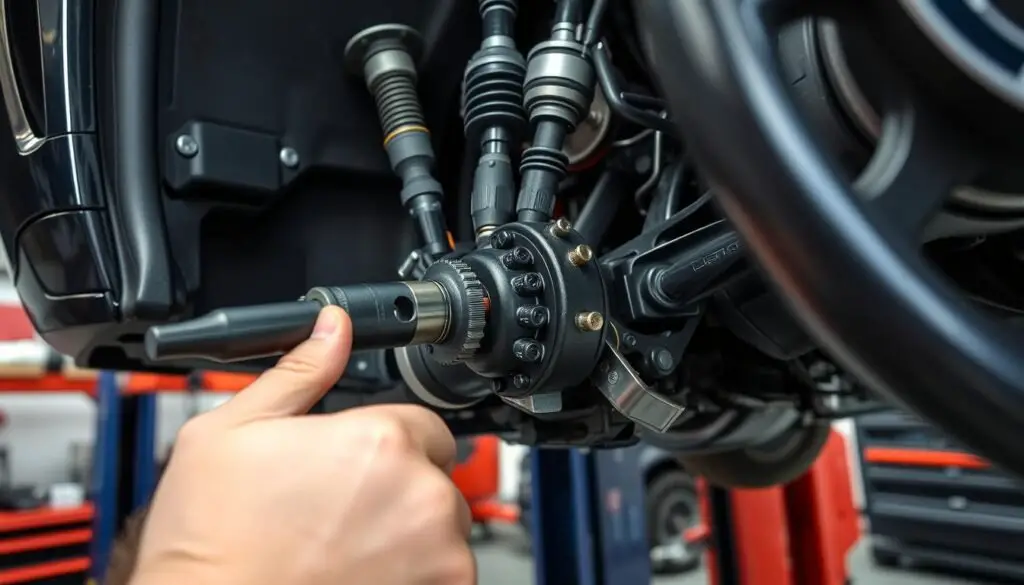
Drivetrain Problems Leading to Steering Wheel Vibration
Drivetrain issues often go unnoticed but can cause a vibrating steering wheel. Problems with parts like the driveshaft, universal joints, or differentials can send vibrations to the steering. This makes driving uncomfortable.
Finding the source of these vibrations requires a close look at the drivetrain parts. For example, a damaged or unbalanced driveshaft can cause the steering wheel to vibrate, especially when driving fast. Also, worn-out universal joints can lead to uneven motion, causing steering issues.
Here’s a table comparing common drivetrain problems and their effects on steering wheel vibration:
| Drivetrain Problem | Impact on Steering Wheel Vibration |
|---|---|
| Imbalanced Driveshaft | Causes severe vibrations at high speeds |
| Faulty Universal Joints | Leads to jerky movements and vibrations |
| Worn Differentials | Produces continuous vibrations while driving |
Regular maintenance and replacing worn parts can stop these problems. If your steering wheel vibrates, check the drivetrain. Keeping all parts in good shape improves your car’s performance and comfort.
Troubleshooting and Eliminating Steering Wheel Vibration
Steering wheel vibration can be really annoying. But knowing what causes it is key to fixing it. This guide will help you find and fix the problem. It also tells you when to get help from a pro.
Step-by-Step Troubleshooting Guide
To find out why your steering wheel is vibrating, follow these steps:
- Inspect Tires: Look for uneven wear, bald spots, or damage. If you find any, replace the tires.
- Examine Wheel Balancing: Unbalanced wheels can cause a lot of vibration. Take your car to a trusted service center to balance the wheels.
- Check Wheel Alignment: If your car pulls to one side, it might be misaligned. Get the alignment checked.
- Investigate Suspension Components: Worn-out suspension parts can also cause vibration. Check and replace any damaged parts.
- Assess the Brake System: Sometimes, brake problems can cause vibration. Check brake pads, rotors, and other parts.
When to Seek Professional Help
Some problems you can fix yourself, but others need a pro:
- Persistent Vibration: If you’ve tried everything and the vibration won’t go away, get help.
- Complex Brake Issues: If your brakes are giving you trouble, a mechanic should take a look to keep you safe.
- Severe Tire or Suspension Damage: Big damage might need special tools and skills.
- Lack of Equipment: For tasks that need special tools, like precise wheel alignment, get a pro.
Conclusion
Our guide on steering wheel vibration has come to an end. It’s clear that knowing what causes it and how to fix it is key. Issues like tire wear and wheel misalignment need attention. So do problems in the suspension or brake systems.
Fixing steering wheel vibration is about maintenance and quick fixes. Keep your wheels balanced and correct any misalignments. Also, check your suspension often. This helps avoid future problems and keeps your car running well.
Using these tips in your car care routine helps you handle vibration issues well. A smooth ride is not just more comfortable. It also makes driving safer. Remember, fixing problems quickly and checking your car often keeps it in great shape.
FAQ
What causes vibration in the steering wheel?
Several things can cause a vibrating steering wheel. These include worn-out tires, unbalanced wheels, and misaligned wheels. Also, problems with the suspension, brakes, or drivetrain can cause it. It’s important to find and fix the main cause.
How do I fix a vibrating steering wheel?
To fix a vibrating steering wheel, first find the problem. Then, fix it. You might need to balance the wheels, align them, or replace parts. Checking the tires and brakes is also important. Regular maintenance helps avoid vibrations.
Why is my car vibrating when driving?
Car vibrations can come from many sources. These include unbalanced wheels, misaligned wheels, and worn-out tires. Also, damaged suspension parts or problems with the drivetrain or brakes can cause it. Fixing these issues can make your ride smoother.
What are the reasons for steering wheel shaking?
Steering wheel shaking can be caused by several things. These include unbalanced tires, uneven wear, and misaligned wheels. Faulty suspension parts and brake system issues can also cause it. Finding and fixing these problems can help stop the shaking.
How can I diagnose steering wheel vibration?
To diagnose steering wheel vibration, start by noticing when and how it happens. Check the tires for wear and damage. Also, check if the wheels are balanced and inspect the suspension and brakes. Sometimes, you might need professional tools to find the problem.
What is the importance of wheel balancing for vibration?
Wheel balancing is key to preventing and fixing steering wheel vibration. It ensures even tire wear and a smooth ride. This helps distribute weight evenly and reduces vibrations, making driving more comfortable.
How does wheel alignment affect steering wheel vibration?
Wheel alignment affects how stable the steering is and tire wear. If the wheels are not aligned right, it can cause uneven tire wear and vibrations. Making sure the wheels are parallel and angled correctly can prevent these issues.
What are the signs of suspension problems causing steering wheel vibration?
Signs of suspension problems include uneven tire wear and excessive bouncing after hitting a bump. You might also hear unusual noises when driving over rough surfaces. Checking and fixing worn or damaged suspension parts can solve these vibrations.
Can brake issues lead to a vibrating steering wheel?
Yes, brake problems like warped brake rotors or uneven brake pad wear can cause steering wheel vibration. Regular brake checks and maintenance can help avoid these vibrations.
How do drivetrain problems cause steering wheel vibration?
Drivetrain problems can lead to vibrations in the steering wheel. Issues like worn-out driveshafts or CV joints can cause uneven power transfer. Checking and fixing these parts can solve the problem.
When should I seek professional help for steering wheel vibration?
For simple issues, you can try basic maintenance to fix steering wheel vibration. But, for complex problems like severe suspension damage or drivetrain issues, a professional mechanic is needed. If DIY efforts don’t work, it’s time to get expert help.


